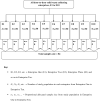Prevalence and associated factors of acute respiratory infection among street sweepers and door-to-door waste collectors in Dessie City, Ethiopia: A comparative cross-sectional study
- PMID: 33989364
- PMCID: PMC8121341
- DOI: 10.1371/journal.pone.0251621
Prevalence and associated factors of acute respiratory infection among street sweepers and door-to-door waste collectors in Dessie City, Ethiopia: A comparative cross-sectional study
Expression of concern in
-
Expression of concern: Prevalence and associated factors of acute respiratory infection among street sweepers and door-to-door waste collectors in Dessie City, Ethiopia: A comparative cross-sectional study.PLoS One. 2025 Aug 4;20(8):e0329446. doi: 10.1371/journal.pone.0329446. eCollection 2025. PLoS One. 2025. PMID: 40758613 Free PMC article. No abstract available.
Abstract
Background: Acute respiratory infections are rising in developing countries including Ethiopia. Lack of evidence for the prevalence and associated factors of acute respiratory infection among street sweepers and door-to-door waste collectors in Dessie City, Ethiopia is a challenge for the implementation of appropriate measures to control acute respiratory infection. Thus, this study was designed to address the gaps.
Methods: A comparative cross-sectional study was conducted among 84 door-to-door waste collectors and 84 street sweepers from March to May 2018. A simple random sampling technique was used to select study participants. Data were collected by trained data collectors using a pretested structured questionnaire and on-the-spot direct observation checklist. Data were analyzed using three different binary logistic regression models at 95% confidence interval (CI): the first model (Model I) was used to identify factors associated with acute respiratory infection among street sweepers, whereas the second model (Model II) was used to identify factors associated with acute respiratory infection among door-to-door waste collectors, and the third model (Model III) was used for pooled analysis to identify factors associated with acute respiratory infection among both street sweepers and door-to-door waste collectors. From each model multivariable logistic regression, variables with a p-value <0.05 were taken as factors significantly associated with acute respiratory infection.
Results: The overall prevalence of acute respiratory infection among studied population was 42.85% with 95% CI (35.1, 50.0%). The prevalence of acute respiratory infection among street sweepers was 48.80% (95% CI: 37.3, 64.8%) and among door-to-door waste collectors was 36.90% (95% CI: 27.4, 46.4%). There was no statistically significant difference between the prevalence of acute respiratory infection among the two groups due to the overlapping of the 95% CI. Among the street sweepers, we found that factors significantly associated with acute respiratory infection were not cleaning personal protective equipment after use (adjusted odds ratio [AOR]: 2.40; 95% CI: 1.15, 5.51) and use of coal/wood for cooking (AOR: 3.95; 95% CI: 1.52, 7.89), whereas among door-to-door waste collectors, were not using a nose/mouth mask while on duty (AOR: 5.57; 95% CI: 1.39, 9.32) and not receiving health and safety training (AOR: 3.82; 95% CI: 1.14-7.03) were factors significantly associated with acute respiratory infection among door-to-door-waste collectors. From the pooled analysis, we found that not using a nose/mouth mask while on duty (AOR: 2.19; 95% CI: 1.16, 4.53) and using coal/wood for cooking (AOR: 2.74; 95% CI: 1.18, 6.95) were factors significantly associated with acute respiratory infection for both street sweepers and door-to-door waste collectors.
Conclusion: The prevalence of acute respiratory infection among street sweepers and door-to-door waste collectors has no statistically significant difference. For both groups, not using a nose/mouth mask while on duty and using coal/wood for cooking fuel factors associated with acute respiratory infection. The municipality should motivate and monitor workers use of personal protective equipment including masks and gloves. Workers should use a nose/mouth mask while on duty and should choose a clean energy source for cooking at home.
Conflict of interest statement
The authors have declared that no competing interests exist.
Figures





References
-
- Lozano R, Naghavi M, Foreman K, Lim S, Shibuya K, Aboyans V, et al. Global and regional mortality from 235 causes of death for 20 age groups in 1990 and 2010: A systematic analysis for the Global Burden of Disease Study 2010. The Lancet. 2012;380(9859):2095–128. 10.1016/S0140-6736(12)61728-0 - DOI - PMC - PubMed
-
- Cointreau S. Occupational and environmental health issues of solid waste management: Special emphasis on middle-and lower-income countries. Urban Papers. 2006;2.
Publication types
MeSH terms
LinkOut - more resources
Full Text Sources
Other Literature Sources

